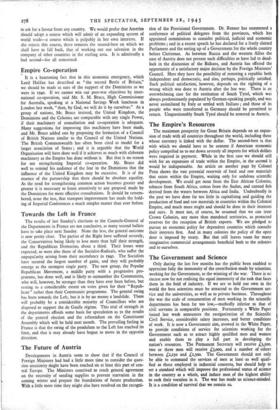The Government and Science
Only during the last few months has the public been enabled to appreciate fully the immensity of the contribution made by scientists, working for the Government, to the winning of the war. There is no excuse now for not realising the equal immensity of the task that faces them in the field of industry. If we are to hold our own in the world the best scientists must be attracted to the Government ser- vice and the universities, as well as to private business. Throughout the war the scale of remuneration of men working in the scientific departments has been far too low,—markedly inferior to that of civil servants in comparable positions. Fortunately a White Paper issued last week announces the reorganisation of the Scientific Civil Service, considerable salary increases, and better conditions of work. It is now a Government aim, avowed in the White Paper, to provide conditions of service for scientists working for the Government such as to attract highly qualified men and women and enable them to play a full part in developing the nation's resources. The Permanent Secretary will receive L3,500, two or three men will receive £3,000, and a number of others between £2,250 and £2,500. The Government should not only be able to command the services of men at least •as well quali- fied as those employed in industrial concerns, but should help to set a standard which will improve the professional status of science in the country as a whole, and induce men of the highest ability to seek their vocation in it. The war has made us science-minded. It is a condition of survival that we remain so.


























 Previous page
Previous page